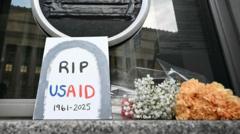Experts in global health have voiced serious concerns following the United States government's decision to freeze funding for the United States Agency for International Development (USAID), which manages billions in overseas assistance annually. The Trump administration's recent move to cut USAID's workforce and halt its aid programs for a 90-day review aligns with Trump's "America First" strategy, which is critical of foreign spending.
This decision has significant implications for public health efforts. Experts assert that the suspension could facilitate the spread of diseases and delay the development of essential vaccines and treatments. USAID is not only responsible for numerous health programs but also provides funding to various NGOs to deliver health services globally. The uncertainty caused by the funding freeze is already causing disruptions for these organizations.
Dr. Tom Wingfield, an expert in tuberculosis (TB) from the Liverpool School of Tropical Medicine, emphasized the potential for increased disease transmission due to service interruptions. He highlighted the criticality of USAID’s role in fighting TB, which claims 1.3 million lives annually. With reduced funding, healthcare providers may struggle to offer preventive care, thereby exacerbating the situation. The deterioration in care for HIV patients is another dire consequence. NGOs, vital for delivering anti-retroviral treatments, report that they are suspending services, compromising the health of countless patients.
In a statement highlighting the chaos triggered by the aid freeze, John Plastow, Executive Director of Frontline AIDS, articulated the profound effects on vulnerable communities, particularly in countries like Uganda and South Africa, where essential health services are collapsing under funding constraints.
Experts also warned that the loss of USAID funding would stall crucial international clinical drug trials, potentially delaying new treatments for diseases such as malaria and HIV, which depend significantly on this support.
Professor Rosa Freedman of the University of Reading expressed grave concerns that a prolonged funding freeze could lead to the re-emergence of preventable diseases that had previously been under control. The global network is vulnerable, and these diseases could easily spread beyond borders, causing further healthcare crises.
The situation remains urgent, with health professionals advocating for swift action to restore funding and recommence essential health services before catastrophic effects ripple across the globe.




















